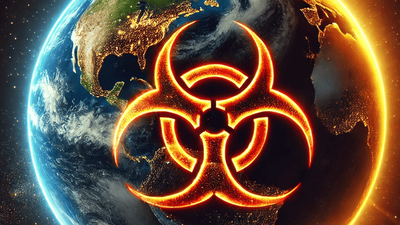Dr. Peter Hotez, a prominent advocate for mRNA vaccine technology, is back in the spotlight following a recent segment in which he expressed concerns about public health under a potential new Trump administration. In remarks made on MSNBC, Hotez predicted that multiple pandemics could emerge shortly after Trump’s inauguration. His comments targeted several of Trump’s healthcare nominees, particularly Robert F. Kennedy Jr., suggesting that the U.S. may face a wave of infectious diseases beginning on January 21st. Hotez enumerated a diverse array of viruses as potential threats, including the bird flu, new coronaviruses, mosquito-borne illnesses like dengue fever and Zika, along with lesser-known pathogens such as the Oropouche virus and yellow fever.
Critics of Hotez, such as John Leake writing for Dr. Peter McCullough’s Substack, have interpreted his statements as not merely predictive but also as an insinuation of desire for a health crisis. This perspective hinges on Freudian analysis, which posits that subconscious fantasies can manifest in one’s language. There’s a suggestion that Hotez’s remarks reflect an anticipation of a calamity, as they coincide with the rising alarm over “Disease X,” a mysterious illness reported in the Democratic Republic of Congo, which has already resulted in significant morbidity and mortality. As health officials and the World Health Organization monitor the situation, the public is left questioning the validity of these warnings and whether they are sincere or fearmongering.
The emergence of Disease X raises several questions regarding the motivations behind pandemic predictions. Some speculate that these ongoing warnings may serve the interests of global pharmaceutical companies, potentially leading to the development of new vaccines aimed at boosting profit margins. The conjecture around a planned pandemic as a tactic against Trump, rather than a genuine public health concern, further complicates the narrative. Amid this uncertainty, many advocate for a more proactive and independent approach to health management, minimizing reliance on pharmaceutical companies and the institutional healthcare system that some deem untrustworthy.
In response to the perceived threats of emerging diseases, The Wellness Company has introduced a “Contagion Emergency Kit,” designed to empower individuals with essential medications to address potential health crises. This kit, spearheaded by Dr. Peter McCullough and his team, includes five critical prescription medications that proponents argue every household should have on hand. Items such as generic Tamiflu, hydroxychloroquine, and ivermectin are included, alongside azithromycin and inhaled budesonide in a nebulizer kit. Advocates emphasize that having such medications readily available can save lives, promoting a sense of preparedness rather than panic.
The marketing strategy for the Wellness Company’s kit focuses on appealing to public fears surrounding the unpredictable nature of emerging illnesses and pandemic preparedness. Testimonials from satisfied customers highlight feelings of security and peace of mind, suggesting that possessing this kit offers a safeguard against potential medical shortages or health emergencies. The kit’s exclusive availability through a questionnaire-based prescription system adds to its allure, implying a personalized and legitimate approach to health care that stands apart from conventional pharmacy options.
As public discourse evolves around health preparedness in light of potential new pandemics, questions remain concerning the ethical dimensions of messaging surrounding these products and predictions. The blend of forecasts about disease outbreaks, coupled with a push for private pharmaceutical preparedness, illustrates a complex landscape where fear, market opportunities, and genuine health needs intersect. The ongoing narrative underscores a critical examination of how public health messaging is constructed and the interests that might shape it, ultimately prompting society to consider what constitutes effective and ethical health advocacy in an era marked by rapid change.

